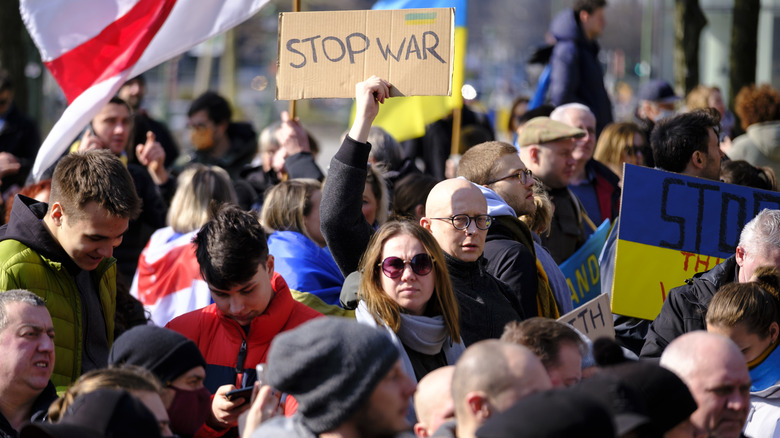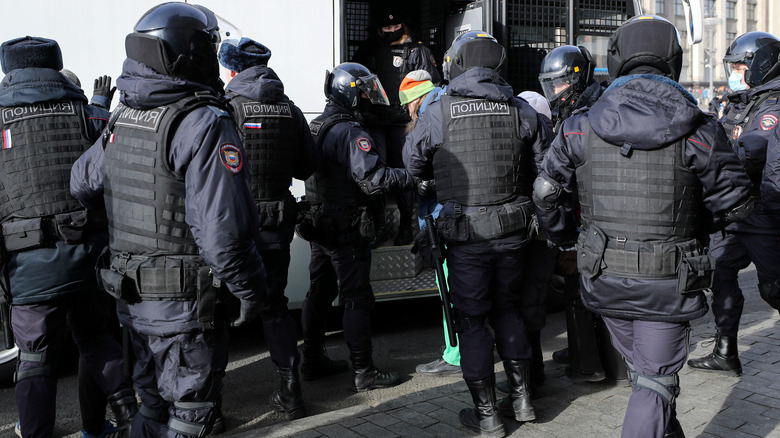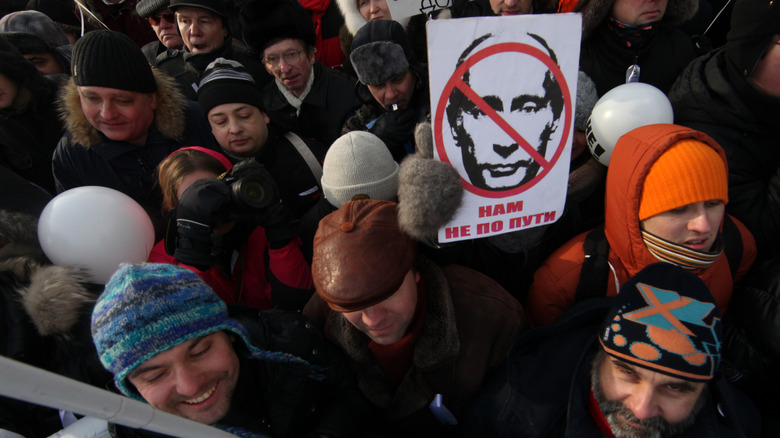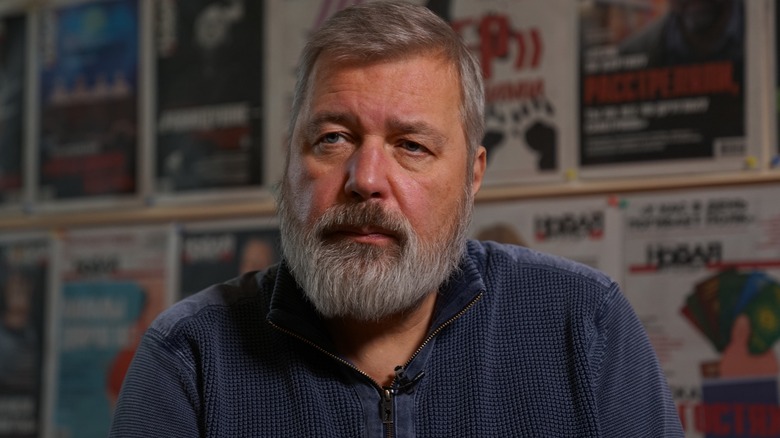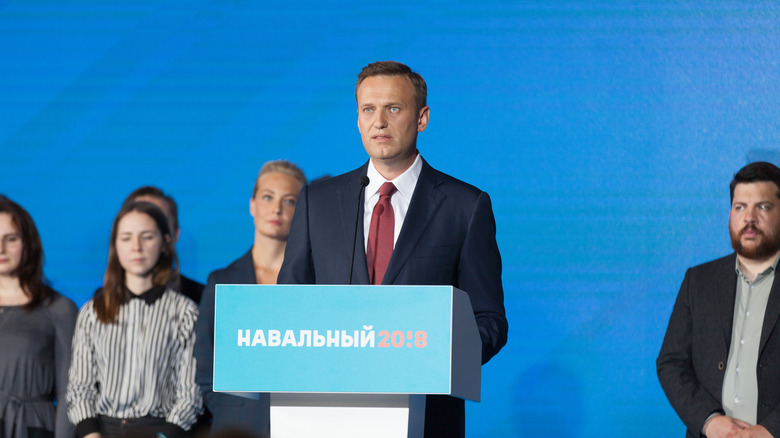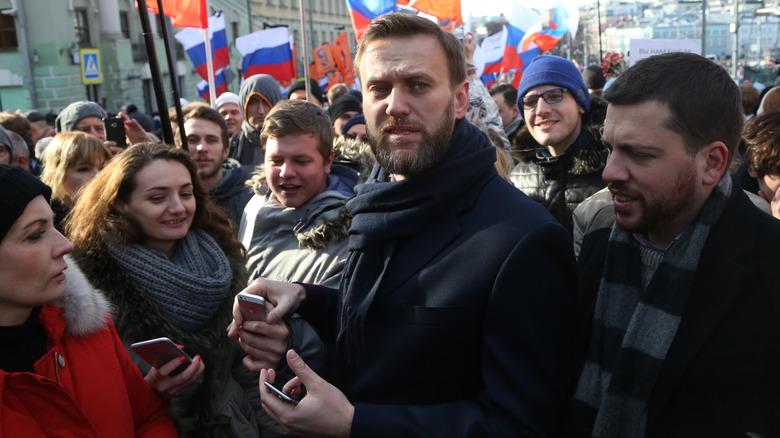What Are The Risks Of Being An Anti-War Protester In Russia?
Throughout modern history, people have launched protests in opposition to various wars — the Vietnam War may immediately come to mind for many, considering how often it's been portrayed in movies, TV, and other pop culture mediums, but other wars have proven to be unpopular with large groups of people who believe violence has no place when it comes to conflict resolution. Then you've got those who believe that their country should not be interfering in foreign wars by sending troops to battle overseas. Either way, it goes without saying that protests have long been inevitable whenever one nation declares war on another.
With the Russia-Ukraine crisis on everybody's lips following the events of February 24, 2022, when Russia launched a full-scale invasion on Ukraine, one has to wonder about the anti-war protests that have been taking place as of late. What happens to protesters when caught, and what consequences do people or organizations face if they oppose the war — or the Russian government — in any way, shape, or form? The answer to those questions isn't pretty, as protesters face different kinds of risks if they choose to make their voices heard, or even head to the streets for a peaceful protest.
Detention is the most common form of punishment for protesters
A quick look at the news will tell you that detention is the most common, and obvious punishment that protesters face in Russia. A report from the BBC noted that more than 4,300 people across 53 cities were detained on Sunday, March 6, 2022, as anti-war protests raged across Russia, with almost 40% of those protesters having been detained in Moscow alone. This brought the number of protesters detained over the last week and a half or so to about 10,000, according to the human rights group OVD-Info. "The screws are being fully tightened — essentially we are witnessing military censorship," remarked OVD-Info spokeswoman Maria Kuznetsova. "We are seeing rather big protests today — even in Siberian cities, where we only rarely saw such numbers of arrests."
The rising number of detentions in Russia amid the country's conflict with Ukraine should come as no surprise, as the Putin administration has passed a number of laws over the past few years that have made it progressively more difficult for protesters to gather in public for their causes. The BBC cited a statement from Amnesty International that highlighted the language used in these laws; the words "permit" and "ban" are purposely not mentioned, but it is very clear that anyone who wishes to hold an assembly needs some form of authorization from the government. Which, as one can surmise, is nigh impossible if you consider what these protesters are fighting against.
Remember Bolotnaya Square: The law can resort to violence against protesters
The Bolotnaya Square protests of May 2012, which took place a day before Vladimir Putin's presidential inauguration, are widely seen as the turning point for the Kremlin's crackdown on public demonstrations. With that in mind, the fallout from the protests is also a grim reminder of what the cops may resort to if things get out of hand. According to The Conversation, more than 600 people were arrested, and close to 40 were sentenced for their involvement in the demonstration. A number of protesters ended up clashing with the police during the event, and more than 80 individuals suffered injuries in the process.
The alleged instances of police brutality during the Bolotnaya Square rally immediately caught the attention of human rights groups, especially since there were numerous peaceful protesters who were detained or even subjected to force. "Though some protesters apparently disobeyed police orders and even attacked police officers, we received many credible reports of police detaining peaceful protesters along with those who violated the law," read a statement from Human Rights Watch's Europe and Central Asia director, Hugh Williamson. "We are also concerned about allegations of police brutality, including beatings and causing unnecessary pain and suffering."
Russia has strict laws against those who publish unflattering reports about its military
Aside from the individuals who show up for peaceful protests in the streets of Russia, news outlets also face the wrath of the Kremlin for publishing content that goes against the government's ideals. Despite orders prohibiting the use of the word "war" in new stories, publications are still offering blow-by-blow coverage of the conflict between Russia and Ukraine, as noted by The Conversation. And they're doing so at the risk of getting fined or spending time behind bars — the Russian parliament passed a law on March 4, 2022, stating that individuals or outlets who publish "fake news" about the military and its activities may face a jail sentence of up to 15 years or receive hefty fines.
One notable example of a Russian news outlet that fearlessly reported on the invasion of Ukraine is Novaya Gazeta. The publication's editor-in-chief, Dmitry Muratov (pictured above), was one of two co-winners of the 2021 Nobel Peace Prize for his "efforts to safeguard freedom of expression." On February 25, Novaya Gazeta published a short, yet powerful headline that, when translated to English, reads "Russia. Bombs. Ukraine." The outlet, however, announced shortly thereafter that it would remove Ukraine-related content, given how "military censorship in Russia has quickly moved to a new phase."
A prominent opposition leader claimed he was poisoned by Russia's FSB
For the past several years, Alexei Navalny has been one of the Russian government's staunchest critics, so much so that he's practically Vladimir Putin's version of Lord Voldemort. According to The Guardian, the president has, in his harsher moments, called Navalny a "poor excuse for a politician," and alternately referred to him in interviews as "this gentleman," "this character you mentioned," or "a certain political force," but has never publicly referred to him by his name. But on a darker note, Putin has also been accused by the opposition leader of orchestrating multiple attacks against him, the most recent of which saw him poisoned with a Novichok nerve agent in August 2020. This apparent attempt on Navalny's life was condemned by a number of world leaders, with then-German Chancellor Angela Merkel saying that the toxicological findings raised "very difficult questions that only the Russian government can answer, and has to answer."
During his 2021 trial for violating the terms of his probation over a 2014 money laundering case, he openly accused Putin of attempted murder, claiming that Russia's FSB intelligence agency planted the nerve agent on his underwear (via Deutsche Welle). At the time of writing, Navalny is in jail after being found guilty of the aforementioned charges and could spend another 15 years behind bars for allegedly embezzling donations to his own anti-corruption group. He is, however, still as vocal as ever about his opposition to the Kremlin, encouraging his countrymen to keep protesting against the invasion of Ukraine and stressing that Russia should not be a "nation of cowards" (via BBC).
Certain high-ranking opposition figures have gone into exile
Alexei Navalny is far from the only opposition figure who's earned the ire of Vladimir Putin and his administration — after all, his Anti-Corruption Foundation was one of many to be classified in June 2021 as an extremist organization, per Deutsche Welle.
Shortly after Navalny was sent to jail in February of that year, his top aides Vladimir Ashrukov and Leonid Volkov (pictured above, extreme right) fled Russia in hopes of avoiding arrest. But even with Volkov exiled in Lithuania, he remained as dedicated as ever to Navalny's fight against the Kremlin, telling Spectator World in April 2021 that he believes a "demonstration of a million people" could happen in the future. "It is bigger than just calling for Navalny's release," Volkov said. "Our message is that if you are unhappy with Putin for any reason — whether it's economical or political or ecological — join us."
In November 2021, two other people who worked closely with Navalny during his failed presidential campaign were forced into exile. Campaign lawyer Yevgeny Smirnov and St. Petersburg campaign chief Irina Fatyanova confirmed that they had also fled Russia. That same month, Volkov and another exiled Navalny associate, Maria Pevchikh, spoke to reporters and reaffirmed their intention to keep fighting the Putin administration, with Volkov noting (via Yahoo News) that while living in exile isn't an ideal situation, he can take solace in the fact that Russian officials can no longer seize the equipment his organization purchases.
